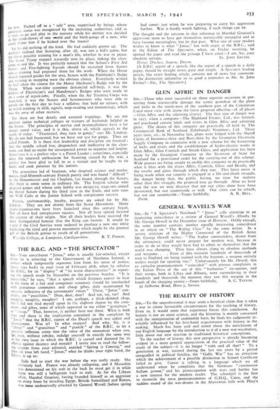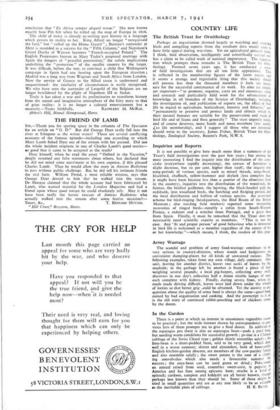THE REALITY OF HISTORY
Sue,—To the unprofessional it may seem a heretical claim that it takes a war to create favourable circumstances for the teaching of history. Even so, it would seem that experience forces this conclusion. As history is not an exact science, and the historian is mainly concerned with the interpretation of undeniable facts, he finds his judgement in- evitably influenced by his first-hand acquaintance with history in the making. Much has been said and noted about the enrichment of our English language by the introduction to it of a new war-vocabulary, little about our new reaction to traditional historical conceptions.
To the teacher of history this new perspective is already becoming evident in a more general appreciation of the practical value of the study of the subject—it is no longer " to66 and all that! " To a generation at war, tutored during the last ten years by a period unequalled in political fertility, the "Gallic War" has an attraction which the achievement of a possible distinction in School Certificate failed to give. Caesar is talking in a language which we all understand when he complains that the Germans "continenter helium ger:gni," and his preoccupation with wars and battles has a new interest for the modem reader. The schoolgirl is the first to reconcile the terse pronouncements of G.H.Q., Cairo, and the sudden sound of the war-drums in the Abyssinian hills with Pliny's
conclusion that "Ex Africa sent per altquid novae." She now knows exactly how Pitt felt when he rolled up the map of Europe in 18o6.
The child of today is already re-writing past history in a language which proves its reality to her. King Alfred no longer "reorganised the fyrd," but "called up the Home Guard " ; Bazaine's surrender at Metz is recorded as a success for the "Fifth Column," and Napoleon's Grand Duchy of Warsaw becomes "French-occupied Poland." The English Protestants foresee in Mary Tudor's proposed marriage with Spain the dangers of "peaceful penetration," the subtle implications underlying the " protection " of the smaller country by the larger. It was difficult, before the war, to convince a child that Wellington's campaign in Spain had any bearing upon the European Situation; Madrid was a long way from Wagram and South Africa from London. Now the service of Greece to the Allied cause is understood and unquestioned: the similarity of circumstances is easily recognised. We who have seen the surrender of Leopold of the Belgians are no longer bewildered by the plight of Napoleon III at Sedan.
Truly it has taken a war and its preliminaries to transform history from the unreal and imaginative atmosphere of the fairy story to that of grim reality : it is no longer a cultural entertainment but a
necessity.—Yours faithfully, KATHLEEN M. MCRAE. Abbot's Hill, Hemel Hempstead, Hens.































 Previous page
Previous page